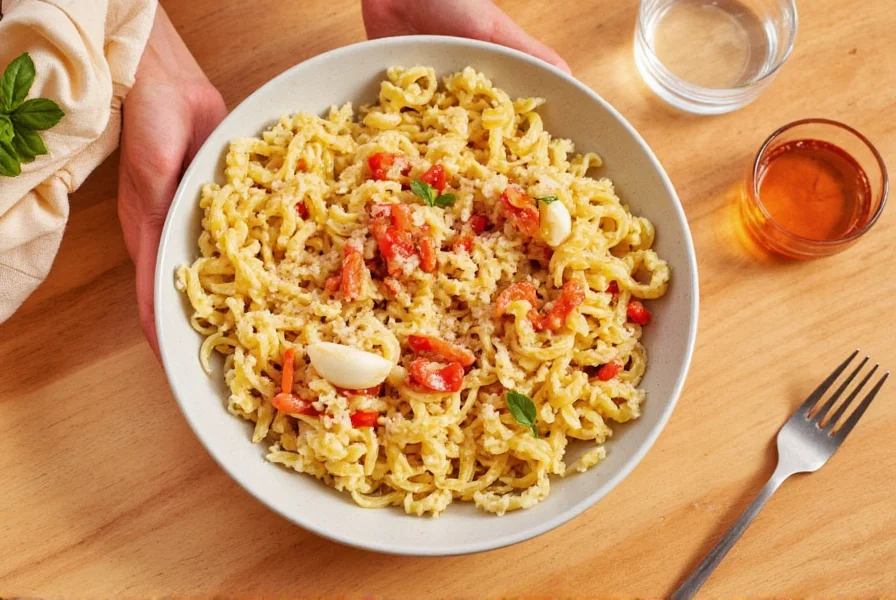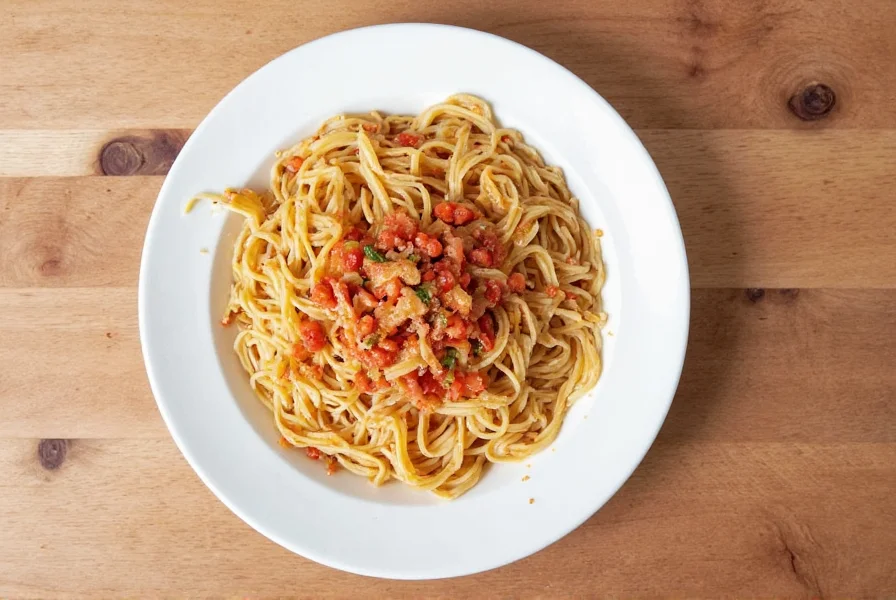Easy Roasted Tomato Garlic Pasta Recipe
Ready in just 30 minutes, this simple roasted tomato garlic pasta is packed with flavor. Here's how to make it:
Ingredients
- 1 pint cherry tomatoes
- 4 cloves garlic, minced
- 2 tbsp olive oil
- 1 tsp dried oregano
- ½ tsp red pepper flakes (optional)
- 8 oz spaghetti
- Fresh basil, chopped
- ¼ cup grated Parmesan cheese
- Lemon zest from 1 lemon
- Salt and pepper to taste
Instructions
- Preheat oven to 400°F (200°C). Line a baking sheet with parchment paper.
- Halve the cherry tomatoes and place them on the baking sheet. Add minced garlic cloves.
- Drizzle with olive oil, dried oregano, red pepper flakes (if using), salt, and pepper. Toss to coat evenly.
- Roast in the oven for 15-20 minutes, until tomatoes are blistered and soft.
- Cook spaghetti according to package instructions until al dente. Reserve ½ cup pasta water.
- While pasta cooks, prepare the sauce: in a large bowl, combine roasted tomatoes and garlic. Add fresh basil, lemon zest, and Parmesan cheese.
- Drain pasta and add it to the bowl with the sauce. Toss well, adding reserved pasta water as needed to create a creamy consistency.
- Serve immediately with extra Parmesan and basil.
Pro Tip: For extra flavor, add a splash of balsamic vinegar to the roasted tomatoes before baking.
| Spice | Storage Location | Container Type | Shelf Life |
|---|---|---|---|
| Oregano (dried) | Cool, dark pantry | Airtight glass jar | 1–3 years |
| Red Pepper Flakes | Kitchen cabinet away from heat | Plastic or glass container | Up to 2 years |
| Smoked Paprika | Dark pantry | Metal tin with lid | 6 months–1 year |
| Basil (fresh) | Refrigerator or room temp water | Glass jar with water | 5–7 days |
Spice Hacks to Elevate Your Tomato-Garlic Pasta
Enhance your dish with these expert spice tips:
1. Add a Pinch of Red Pepper Flakes (For That Secret Kick)
- Add ½ tsp red pepper flakes while sautéing the garlic.
- It adds warmth without overpowering the sweetness of the tomatoes.
2. Crush Some Dried Oregano Between Your Fingers
- This releases the essential oils for more potent aroma and taste.
- Dried oregano holds up better during roasting than fresh.
3. Finish with Fresh Basil + Grated Parmesan
- Fresh basil gives a bright, herbal contrast.
- Parmesan adds saltiness and another layer of umami.
4. Use Smoked Paprika for a Deeper, Earthier Note
- Smoked paprika complements roasted vegetables beautifully.
- A little goes a long way — start with ¼ tsp.
5. Sprinkle in a Dash of Lemon Zest
- Zest brightens the dish and balances acidity.
- No need to add lemon juice — just a bit of zest is enough!
| Spice | Best Feature | Advantage | Use Case | Who Should Buy |
|---|---|---|---|---|
| McCormick Gourmet Organic Dried Oregano | Certified organic, robust flavor | Consistent taste, perfect for Italian dishes | Slow-roasting with tomatoes | Home cooks and pasta lovers |
| Badia Crushed Red Pepper | Uniform heat level | Easy to measure, consistent spiciness | Sautéing with garlic before adding tomatoes | Beginners and spice enthusiasts |
| La Flor Smoked Spanish Paprika | Natural wood-smoked process | Earthy depth and color boost | Finishing touch on finished pasta | Cooking pros and adventurous home chefs |
| Starwest Botanicals Whole Basil Leaves | Whole leaf for freshness | Can be crushed or infused | Homemade pesto or garnish | Herb lovers and DIYers |
| PrimoGrain Sea Salt Flakes | Light crunch and clean taste | Ideal for finishing dishes | Sprinkled on top of finished pasta | Anyone looking to upgrade their salt game |
Simple Recipes You Can Make Tonight
1. Quickie Roasted Tomato-Garlic Pasta
- Ingredients: Cherry tomatoes, garlic, olive oil, dried oregano, red pepper flakes, spaghetti.
- Time: 30 minutes
- Pro Tip: Toss everything on a baking sheet and pop in the oven while boiling pasta.
2. Creamy Roasted Tomato-Garlic Pasta Alfredo
- Ingredients: Heavy cream, roasted tomato-garlic mix, Parmesan, smoked paprika.
- Time: 40 minutes
- Pro Tip: Stir in Parmesan slowly to avoid clumping.
3. Vegan Roasted Tomato-Garlic Linguine
- Ingredients: Cashew cream, zucchini noodles, basil, lemon zest.
- Time: 35 minutes
- Pro Tip: Use cashew cream instead of dairy for a creamy texture without lactose.

Frequently Asked Questions
Why does my roasted tomato pasta taste bitter?
Bitterness often comes from over-roasting tomatoes or burning garlic. Roast tomatoes at 400°F (200°C) just until skins blister (15-20 mins), and add garlic halfway through since it roasts faster. Always use the lemon zest hack mentioned in Section 2 — it neutralizes bitterness naturally.
Can I substitute fresh oregano for dried in this recipe?
Yes, but use triple the amount of fresh oregano (e.g., 1 tbsp fresh instead of 1 tsp dried) since dried herbs are more concentrated. Add fresh oregano in the last 5 minutes of cooking to preserve its delicate flavor, unlike dried which benefits from longer roasting.
How do I fix an overly acidic tomato sauce?
Three quick fixes: 1) Stir in ¼ tsp baking soda to neutralize acidity, 2) Add a pinch of sugar to balance flavors (don't overdo it!), or 3) Incorporate the lemon zest trick — its oils cut acidity better than juice. Always adjust seasoning after fixing acidity.
What's the best cheese alternative for dairy-free versions?
Cashew cream (soaked raw cashews blended with water) creates the creamiest texture, as noted in the vegan linguine recipe. Nutritional yeast (2-3 tbsp) adds umami depth similar to Parmesan. For nut allergies, try Kite Hill's almond-based ricotta.
How long do roasted tomato-garlic leftovers last?
Store in an airtight container for up to 4 days in the fridge. Freeze the roasted base (without pasta) for up to 3 months — it's perfect for quick meals. Thaw overnight and reheat with a splash of olive oil to revive flavors.
Conclusion
Roasting tomatoes and garlic might seem simple, but when paired with the right spices and stored properly, they become a culinary powerhouse. From choosing the best oregano to mastering the art of spice timing, every small hack contributes to big flavor results. So next time you pull out that pot of pasta, don't forget to reach for the spice rack. Because great meals start with smart seasoning — and maybe a sprinkle of creativity.











 浙公网安备
33010002000092号
浙公网安备
33010002000092号 浙B2-20120091-4
浙B2-20120091-4